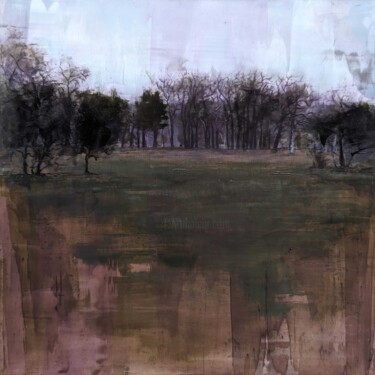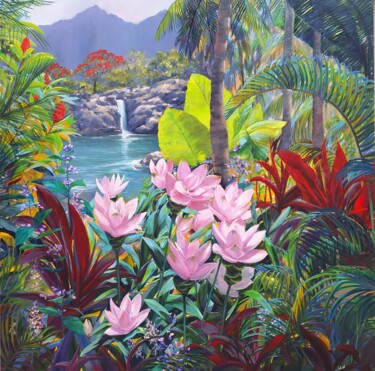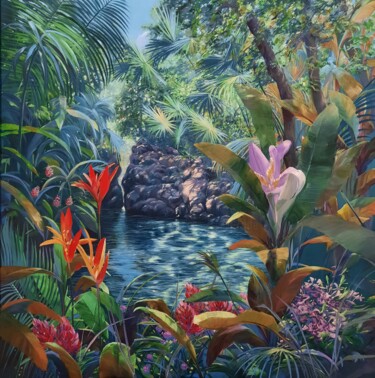
2,165 Original Paintings For Sale:
What is the origin of the Oil technique?
Painting composed of pigments bound with linseed oil or carnations. The traditional technique consists of superimposing layers of increasingly oil-rich paint for a strong and lasting grip. Oil paint uses a substance whose binder consists of a drying oil that envelops the pigment particles. This pictorial technique has crossed the ages thanks to its plastic qualities. At the end of the Middle Ages, it replaced the technique of tempera, then its use became widespread thanks to the Flemish primitives, in particular Jan Van Eyck who used it extensively. It generally consists of color pigments, and a binder which can be linseed oil, carnation oil, or even walnut oil. Many artists have experimented with this queen technique of oil painting, in particular baroque painters like Pierre Paul Rubens, or even romantics like Eugène Delacroix or Théodore Géricault.
Buying artworks on the theme of "Forest"
The forest carries with it a powerful imagination that artists have always loved to depict in their paintings. If we now associate the forest with peaceful walks in nature, it has for centuries been synonymous with dangers for humans: disappearance in the woods, attacks by wolves or bandits ... Oak forests, pine trees, or tropical jungle, the forest plunges us into a dense and often inhospitable universe where trees and vegetation are rulers, returning man to his status of humble guest. Among the artists who have best portrayed the sylvan universe and the forest landscapes in their paintings, we can quote Théodore Rousseau, Gustave Courbet and Jules Dupré.
Looking for Original paintings for sale?
Explore all styles and all painting techniques: contemporary paintings, street art, abstract art, figurative art, landscapes, portraits, still lifes, nudes, watercolor, oil painting, acrylic painting… Artmajeur is for everyone artistic sensibilities and celebrates beauty by your side for 20 years with more than 2 million contemporary works of art to discover ... or acquire! The world benchmark for contemporary paintings. Discover works by contemporary artists from around the world to decorate your interior with class! Simple art lover or confirmed collector? Find the favorite canvas or painting that will truly enhance your decoration. Artmajeur offers you original works, limited editions and art prints by the best contemporary artists in the world. On Artmajeur, the paintings are selected by enthusiasts and experts in the art market. We select for you the original works of trendy, award-winning and recognized painters as well as new rising values in the field of contemporary art to guide you and help you in your process of buying paintings online.
How to buy an oil painting online?
Imagine the day when you actually consider buying an oil painting online. You find a picture that pleases your eye and budget, it's easy to navigate through an art online gallery because they think about everything.
Buying art is a piece of cake ! Artmajeur had deployed its own system (what people might call "the Google" engine) so customers save time researching great pieces without having to visit galleries themselves.
But there are still other options you can have aside from buying an oil painting online. You can explore acrylic and watercolor styles as well.
You can buy oil paintings online in just a few clicks. Not only that, but you will view thousands of images in the art galleries. The website will let you choose from our large offer of paintings from thousands of artists, styles and sizes without having to leave your own home! Ordering an original work is as easy as selecting the perfect piece for yourself or someone else. Just add an artwork to your cart, and you'll be able to see if it's available before clicking "buy" so there won't be any surprises when checking out. You need to read the company shipping policy and people reviews on Google. Just browse the web in your free time for a few days before making a decision.
But if you really want to buy oil paintings online, it would help if you could find a website that gives tips on how to buy these works of art. Most websites would give you advice on how you can choose which painting to buy and also give you a brief explanation.
If you are an art lover and collector, then ordering a painting on canvas is also a great gift idea for your loved ones on special occasions like birthday, wedding, Christmas...
You can also buy oil paintings online that can either be stationary or they can be oil paintings that you can mount on your large walls. You can buy canvas either framed or unframed, buy an original artwork or a limited edition fine art print. Furthermore, you can filter your search by color, size, subject...
When you buy an oil painting online, you will find that there are many choices. You can buy a simple portrait, or you can buy an abstract piece. You can buy landscapes or you can buy portraits. The options are endless. Overall, buying a painting online is really a genuine experience.
Imagine the look on your loved one's face when they unwrap a beautiful oil painting and realize it was bought online. That is what you can provide for them with our easy-to-navigate website, Artmajeur.com, where we have thousands of options available to suit every budget, taste, or occasion. Explore our site now and find that perfect artwork today at the best price!
If you’re looking for a modern art painting to decorate your home or office, we offer a large range of oil paintings from artists all over the world. Our selection includes abstract pieces with vivid colors and realistic portraits that will fit any style. We also have large canvases available, so you can create a unique space made of wall art. Browse our website today to find one-of-a-kind artwork that will make your walls exceptional!
Discover contemporary Artworks on Artmajeur
Contemporary art is a vibrant constellation of artistic expressions. This creative universe encompasses a wide array of mediums, from paintings, sculpture, and photography to drawing, printmaking, textile art, and digital art, each medium a star shining with its own distinct radiance. Artists use diverse supports and materials to bring their visions to life, such as canvas, wood, metal, and even innovative digital canvases for the creation of virtual masterpieces.
A contemporary painting, for instance, may weave its story through the masterful strokes of acrylic or oil, while a contemporary sculpture might sing its song in the language of stone, bronze, or found objects. The photographic arts capture and manipulate light to produce striking images, while printmaking employs techniques like lithography and screen-printing to produce multiples of a single, impactful image. Textile art plays with fabrics and fibers, whereas digital art pushes the boundaries of creation with innovative technology.
The allure of contemporary art lies in its boundary-pushing nature, its relentless quest for experimentation and its constant reflection of the evolving human experience. This boundless creativity, coupled with its strong social and personal commentary, makes every piece of contemporary art a unique emblem of its time, a mirror held up to the realities and dreams of our complex world. It whispers to us, moves us, provokes thought, and kindles a deep emotional response, stirring the soul of anyone willing to listen. It is, indeed, the language of emotions and ideas, spoken in the dialect of our era.

©2024 Hazel Thomson
Origins and history of contemporary art
The story of contemporary art unfolds in the mid-20th century, marked by seismic shifts in artistic expression. Post-World War II, around the 1950s and 1960s, artists began experimenting beyond traditional confines, challenging the norms of what art could be. This revolutionary epoch birthed myriad new movements and artistic forms such as abstract expressionism, pop art, and minimalism. Paintings, once confined by realism, embraced abstraction, as artists used color and form to express emotions and ideas. Notable periods like the advent of pop art in the late 1950s and early 1960s saw artworks mimicking popular culture and mass media, reflecting society’s shifting focus.
The sculptural arts, too, witnessed a metamorphosis. Sculptors started to experiment with new materials and forms, often creating artworks that interacted with the viewer and the surrounding space, fostering a sense of engagement. Drawing, a timeless practice, also evolved, with artists incorporating innovative techniques and concepts to redefine its role in contemporary art.
Photography, a relatively new medium, emerged as a powerful tool in the contemporary art landscape. Born in the 19th century, it truly came into its own in the latter half of the 20th century, blurring the lines between fine art and documentation. Printmaking, a practice dating back to ancient times, saw renewed interest and experimentation with techniques like lithography, etching, and screen printing gaining prominence.
The realm of textile art expanded dramatically, as artists began to appreciate the versatility and tactile quality of fabric and fibers. Artists began using textiles to challenge the boundaries between fine art, craft, and design.
The dawn of digital technology in the late 20th century heralded a new age for contemporary art. Digital art emerged as artists started leveraging new technologies to create immersive, interactive experiences, often blurring the line between the virtual and the physical world.
Through these transformative periods, the essence of contemporary art has remained the same: a dynamic, evolving reflection of the times we live in, continually pushing boundaries and embracing the new, always questioning, always exploring.

©2024 Stepan Ohanyan Artist represented by Narinart Armgallery
Evolutions of theses contemporary works in the art market
As we navigate through the 21st century, the dynamic landscape of contemporary art continues to evolve and expand, reflecting our ever-changing world. Contemporary paintings, once primarily confined to two-dimensional canvases, now embrace a multitude of forms and techniques, ranging from mixed media installations to digital creations, each piece a rich a weaving of thoughts, emotions, and narratives. Sculpture, too, has ventured far beyond traditional stone and bronze, with artists incorporating light, sound, and even motion, embodying the ephemerality and flux of the modern world.
Photography, in the hands of Contemporary Artists, has expanded its horizons, seamlessly blending with digital technology to create breathtaking imagery that challenges our perception of reality. Drawing, as well, has transcended the borders of paper, incorporating multimedia elements and exploratory techniques to redefine its role in the artistic discourse. Printmaking continues to flourish, with contemporary artists using traditional methods in innovative ways to deliver potent social and personal commentaries.
Textile art, once considered a craft, now holds a prominent place in the contemporary art world, with artists using it to explore issues of identity, tradition, and cultural heritage. Meanwhile, digital art, the newest member of the contemporary art family, has revolutionized the way we create and interact with art, presenting immersive experiences that blur the boundary between the virtual and the physical.
These diverse forms of contemporary art hold significant value in the current art market, not only due to their aesthetic appeal but also their ability to encapsulate and communicate complex ideas and emotions. Collectors, curators, and art lovers worldwide seek these works, drawn to their inherent dynamism, their innovative use of materials, and their eloquent expressions of our shared human experience. As a testimonial to our times, these contemporary artworks encapsulate the pulse of our society and the resonance of individual voices, forever etching our collective narrative into the annals of art history.

©2024 Moaso Aier
Famous Contemporary Artists
As we delve into the vibrant realm of contemporary art, we encounter an array of artists who shape this dynamic field. Each a master in their medium - painting, sculpture, photography, drawing, printmaking, textile, or digital art - they push artistic boundaries, reflecting our era and challenging perceptions. Let’s explore these remarkable contributors and their groundbreaking works.
1. Gerhard Richter - Known for his multi-faceted approach to painting, Richter challenges the boundaries of the medium, masterfully oscillating between abstract and photorealistic styles. His works, whether featuring squeegee-pulled pigments or blurred photographic images, engage in a fascinating dialogue with perception.
2. Jeff Koons - A significant figure in contemporary sculpture, Koons crafts monumental pieces that explore themes of consumerism, taste, and popular culture. His iconic balloon animals, constructed in mirror-polished stainless steel, captivate with their playful yet profound commentary.
3. Cindy Sherman - An acclaimed photographer, Sherman uses her lens to explore identity and societal roles, particularly of women. Renowned for her conceptual self-portraits, she assumes myriad characters, pushing the boundaries of photography as a medium of artistic expression.
4. David Hockney - Hockney, with his prolific output spanning six decades, is a pivotal figure in contemporary drawing. His bold use of color and playful exploration of perspective convey an intoxicating sense of joy and an unabashed celebration of life.
5. Kiki Smith - An innovative printmaker, Smith’s work explores the human condition, particularly the female body and its social and cultural connotations. Her etchings and lithographs speak to universal experiences of life, death, and transformation.
6. El Anatsui - A master of textile art, Anatsui creates stunning tapestry-like installations from discarded bottle caps and aluminum scraps. These shimmering, flexible sculptures blend traditional African aesthetic with contemporary art sensibilities, speaking to themes of consumption, waste, and the interconnectedness of our world.
7. Rafael Lozano-Hemmer - A leading figure in digital art, Lozano-Hemmer utilizes technology to create interactive installations that blend architecture and performance art. His work, often participatory in nature, explores themes of surveillance, privacy, and the relationship between people and their environments.

©2022 Yehor Dulin
Notable contemporary artworks
The contemporary art landscape is a dynamic patchwork of diverse expressions and groundbreaking ideas, each artwork a unique dialog with its audience. Here are a selection of some renowned contemporary artworks, spanning various media such as painting, sculpture, photography, drawing, printmaking, textile art, and digital art, that have profoundly influenced this vibrant movement.
"Cloud Gate" by Anish Kapoor, 2006 - This monumental stainless steel sculpture, also known as "The Bean," mirrors and distorts the Chicago skyline and onlookers in its seamless, liquid-like surface, creating an interactive experience that blurs the line between the artwork and the viewer.
"Marilyn Diptych" by Andy Warhol, 1962 - An iconic piece of pop art, this silkscreen painting features fifty images of Marilyn Monroe. Half brightly colored, half in black and white, it reflects the dichotomy of celebrity life and its influence on popular culture.
"Rhein II" by Andreas Gursky, 1999 - This photographic artwork, a digitally-altered image of the Rhine River, is celebrated for its minimalist aesthetic. It strips the landscape to its bare essentials, invoking a sense of tranquility and vastness.
"Black Square" by Kazimir Malevich, 1915 - A revolutionary painting in the realm of abstract art, this piece, featuring nothing more than a black square on a white field, challenges traditional notions of representation, symbolizing a new era in artistic expression.
"Puppy" by Jeff Koons, 1992 - This giant sculpture, a West Highland Terrier blanketed in flowering plants, explores themes of innocence, consumer culture, and the interplay between high art and kitsch. It’s a delightful blend of traditional sculpture and garden craft.
"Re-projection: Hoerengracht" by Ed and Nancy Kienholz, 1983-1988 - A room-sized tableau representing Amsterdam’s red-light district, this work combines elements of sculpture, painting, lighting, and found objects. It engages viewers in a stark commentary on commodification and objectification.
"Untitled" (Your body is a battleground) by Barbara Kruger, 1989 - This photomontage, combining black-and-white photography with impactful text, explores issues of feminism, identity, and power. Its potent, confrontational message is a prime example of the power of text in contemporary visual art.
"For the Love of God" by Damien Hirst, 2007 - This sculpture, a platinum cast of a human skull encrusted with 8,601 diamonds, probes themes of mortality, value, and the human fascination with luxury and decadence. It’s a compelling blend of macabre and magnificence.
"Physical impossibility of Death in the Mind of Someone Living" by Damien Hirst, 1991 - This artwork, featuring a tiger shark preserved in formaldehyde, blurs the line between traditional sculpture and biological specimen. It prompts viewers to contemplate mortality and nature’s ferocity.
"One and Three Chairs" by Joseph Kosuth, 1965 - A piece of conceptual art, it presents a physical chair, a photograph of a chair, and a dictionary definition of a chair, thus exploring the relationship between language, picture, and referent in art.
These pieces, in their diversity, exemplify the rich tapestry of contemporary art, each piece a unique commentary on our world and a testament to the limitless potential of creative expression.


Yehor Dulin
Oil on Paper | 9.8x12.8 in

David Kabulashvili
Oil on Cardboard | 7.9x5.9 in

Hani Bettez Al Hani Ramirez Bettez
Oil on Linen Canvas | 51.2x51.2 in

Stepan Ohanyan
Oil on Canvas | 23.6x35.4 in

Sergey Miqayelya
Oil on Canvas | 23.6x31.5 in

Hazel Thomson
Oil on Canvas | 35.8x59.1 in

Anzhelika Izzi
Oil on MDF Board | 7.9x15.8 in

Tanja Frost
Oil on Canvas | 27.6x39.4 in

Ronald Houriez
Oil on Linen Canvas | 19.7x19.7 in

Simone Romani
Oil on Paper | 16.9x12.5 in

























